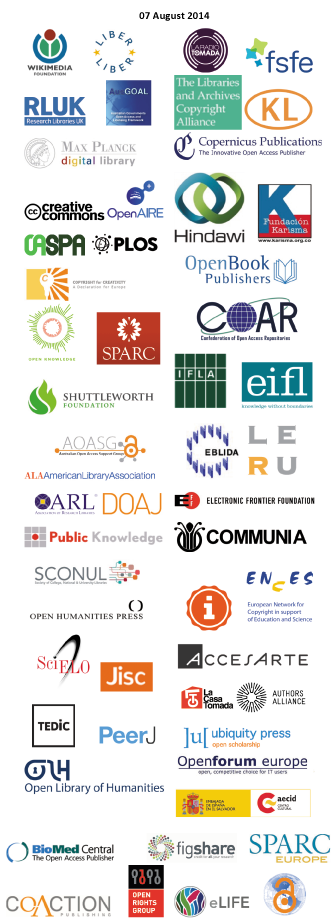 The STM International Association (Scientific, Technical and Medical Publishers), which brings together leading private publishers, recently released a set of licensing models to scientific papers that overlap those set by Creative Commons. The new licensing proposals make more complex the articles access assignments system and prioritize its marketing, limiting access, use, interoperability and exploitation of the published research results. Basically, they deny the principle that scientific knowledge derived from academic research is a public good of humanity that should be available openly.
The STM International Association (Scientific, Technical and Medical Publishers), which brings together leading private publishers, recently released a set of licensing models to scientific papers that overlap those set by Creative Commons. The new licensing proposals make more complex the articles access assignments system and prioritize its marketing, limiting access, use, interoperability and exploitation of the published research results. Basically, they deny the principle that scientific knowledge derived from academic research is a public good of humanity that should be available openly.
The open access movement to scientific articles appeared in the late 90s and was consolidated worldwide in the years 2000s as a fair and consistent way to provide access to research results online, free of charge and of most copyright restrictions and other licenses. In parallel, the Organization Creative Commons (CC) appears in 2001 with the support of the Center for Public Domain, which launches in 2002 the first formalization of copyright licenses.
CC licenses have established a transitional solution between “all rights reserved” and “some rights reserved”, and through different access options assignments, they flexibilized protections and promoted freedom for authors, publishers, and users in general. To use one of the CC licenses is the easiest and usual form for copyright holders to express their consent to the use of open access. There are six types of Creative Commons licenses (CC) with different degrees of flexibility. The broader is the CC BY, allowing distribution, adaptation and modification of content, even for commercial purposes, provided that it is attributed credit to the original author. The stricter is the CC BY-NC-ND, which only allows downloading and sharing the work, provided credit is given to the author, but does not authorize its alteration nor use for commercial purposes. The mission of the Creative Commons initiative is “to develop, support, and provide legal and technical infrastructure to maximize digital creativity, sharing and innovation”. In contrast, the three main and two supplementary licenses suggested by STM International Association propose decreasing degrees of restrictions. The standard license authorizes reproduction for non-commercial purposes, and restricts the use of derivatives; the intermediate license authorizes reproduction, text and data mining, and translations for non-commercial purposes; and finally the wider license authorizes reproduction, text and data mining, and translation for commercial and non-commercial purposes. The supplementary licenses are intended to provide protection for non-commercial purposes for existing licenses, including CC’s.
A coalition formed by governmental organizations, civil society representatives, publishers and directories of open access, and technology platform providers produced a statement that contests license models released by the STM Association. The statement was released simultaneously in several blogs on August 14th, among them PLoS open Blog, Creative Commons, Sparc, Association of Research Libraries, Copyright for Creativity, Wellcome Trust, ScienceOpen, and others. SciELO is a signatory with unanimous support of the coordination of SciELO Network collections. In the case of the SciELO Brazil the Advisory Committee unanimously reaffirmed the use of CC licenses by the journals as a condition for indexing.
The text of the letter¹, signed so far by 83 organizations, appeals to the STM Association to abandon the proposed licenses for open access research articles. These licenses, according to the signatories, “limit the use of research results, and make it difficult, confusing or impossible to combine these results with other public resources and sources of knowledge for the benefit of science and society” (freetranslation). Moreover, these licenses are not compatible with any of the CC licenses available, considered by the signatories as the effective standard of scientific literature, adopted, among others, by governments in Europe, USA and Australia. SciELO pioneered the adoption of open access in 1998, even before the consolidation of the Open Access Movement, which took place in 2002-2003, and since 2009² adopts CC licenses to journal articles in its national and thematic collections. Once again, SciELO aligns with leading global organizations in support of open access and widespread use, sharing, storage and interoperability of search results.
The main criticism of the signers of the Coalition against STM licenses refers to the availability and interoperability of research results. According to Timothy Vollmer’s (2014) post on the Creative Commons blog, “the key to a set of open licenses are simplicity and interoperability”; “[…] we believe that the new licenses may introduce unnecessary complexity and friction, hurting the open access community more than helping” (freetranslation). The letter states that the signatories “share a positive view on the knowledge flow for the good of all, including the adaptation and translation of content aimed at different audiences” (freetranslation). The letter further states that “there is much work to do, but CC licenses already predict easy to understand legal instruments, appropriate to the digital age, machine-readable and applied consistently across all platforms of content” (freetranslation). In fact, the CC licenses have been used by publishers worldwide to share hundreds of thousands of scientific papers that allow the evolution of science from prior knowledge.
The text available on the STM³ page is subtitled “Making Open Access Licensing Work “. What, specifically, is wrong with these licenses? According to Vollmer (2014), first of all, it is not clear what the licenses are intended to and how STM recommends them to be used. Secondly, none of them is compatible with the Open Definition⁴ since all of them limit commercial use and derivatives and also ignore the CC license most recommended and used by publishers in the open access mode, CC BY, according to the recommendation of the Budapest Open Access Initiative. Third, notation and conditions of STM licenses cause uncertainty in the scenario of open access publication, where the CC terms are familiar and well accepted. Fourth, the STM licenses allegedly allow many things for which there is no need to give permission to, such as describe or establish links to licensed articles, and activities such as text and data mining. Finally, additional STM licenses, intended for use with existing licenses only make sense with more restrictive CC licenses, such as the DC-NY-ND, and yet, the effect would be minimal, since most of the legal effect is already covered by CC licenses. In Vollmer’s words, “let’s not reinvent the wheel” (freetranslation).
The list of signatory organizations has been increasing since the date of publication of the Coalition letter on August 7th. This fact shows that institutions, publishers, technology platforms providers and civil society organizations have decided to gather in favor of established, consistent and effective legal tools that enable sharing and reuse of scientific research contents.
Notes
¹ Global Coalition of Access to Research, Science and Education Organizations calls on STM to Withdraw New Model Licenses. PLOS. 2014. Available from: http://www.plos.org/global-coalition-of-access-to-research-science-and-education-organizations-calls-on-stm-to-withdraw-new-model-licenses/?utm_source=newsletter&utm_medium=email&utm_content=full%20letter& utm_campaign=ARL%20Opposes%20STM%20Model%20Licenses
² SciELO adota Creative Commons para atribuição de acesso e uso – http://espacio.bvsalud.org/boletim.php?articleId=10162715200903
³ Open Access Licensing. Making Open Access Licensing Work. International Association of
Scientific, Technical & Medical Publishers. Available from: http://www.stm-assoc.org/open-access-licensing/
⁴ Open Definition. Available from: http://opendefinition.org/
References
Global Coalition of Access to Research, Science and Education Organizations calls on STM to Withdraw New Model Licenses. PLOS. 2014. Available from: http://www.plos.org/global-coalition-of-access-to-research-science-and-education-organizations-calls-on-stm-to-withdraw-new-model-licenses/?utm_source=newsletter&utm_medium=email&utm_content=full%20letter& utm_campaign=ARL%20Opposes%20STM%20Model%20Licenses
VOLLMER, T. Dozens of organizations tell STM publishers: No new licenses. Creative Commons Weblog. 2014. Available from: http://creativecommons.org/weblog/entry/43450
External links
STM – International Association of Scientific, Technical & Medical Publishers – http://www.stm-assoc.org/
Creative Commons – http://creativecommons.org/
 About Lilian Nassi-Calò
About Lilian Nassi-Calò
Lilian Nassi-Calò studied chemistry at Instituto de Química – USP, holds a doctorate in Biochemistry by the same institution and a post-doctorate as an Alexander von Humboldt fellow in Wuerzburg, Germany. After her studies, she was a professor and researcher at IQ-USP. She also worked as an industrial chemist and presently she is Coordinator of Scientific Communication at BIREME/PAHO/WHO and a collaborator of SciELO.
Translated from the original in portuguese by Lilian Nassi-Calò.
Como citar este post [ISO 690/2010]:

















Read comment in Portuguese, by Vilma Reis: http://blog.scielo.org/blog/2014/08/29/scielo-participa-da-coalisao-global-em-defesa-das-licencas-creative-commons-de-acesso-aos-artigos-cientificos/#comment-5972
Read comment in Portuguese, by Jaider: http://blog.scielo.org/blog/2014/08/29/scielo-participa-da-coalisao-global-em-defesa-das-licencas-creative-commons-de-acesso-aos-artigos-cientificos/#comment-6118